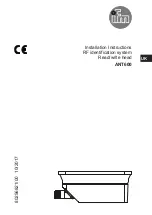
94
Rockwell Automation Publication 2100-IN012D-EN-P - September 2010
Chapter 9
Maintenance
2.
If there are no signs of overheating, but thermal infrared tests indicate
service is required, check the power connections for proper torque.
a. On disconnect switches, service the knife blades with a Scotch-Brite
cleansing pad.
b. Remove all hardened grease.
Care should be taken not to distort the disconnect jaw (stationary
contact).
c. Lubricate with a fine film of NO-OX-ID (catalog number 2100H-N18
for a 0.47 L (1 pt) can, or catalog number 2100H-N18T for a 29.5 ml
(1 oz) tube).
Should the disconnect be subject to environmental conditions causing
chronic tarnishing, it may be necessary to determine if there is an
incompatibility in the plating material, for example, hydrogen sulfide
and silver plating.
On fuses and fuse clips, service by polishing with a Scotch-Brite
cleansing pad. Do not lubricate the fuses or the fuse clips.
3.
If overheating has occurred as indicated by severe tarnishing, infrared test
results, crystallization of insulation on conductors, discoloration of the
components, darkening of the molding materials, brittle conductor
insulation, or deformation and melting of parts, replace the components
that are suspect.
For more information contact, Rockwell Automation LV MCC Technical
Support at 1.440.646.5800 and follow the prompts to Allen-Bradley>Low
Voltage Motor Control Centers>Post Shipment Support.
ATTENTION:
To service the units, make sure that the MCC remote power sources
are disconnected and that the respective disconnects are locked in
the OFF/O position.
If servicing a plug-in unit, remove it from the MCC to facilitate
servicing. Refer to
of this publication for unit removal
guidelines.
When plugging units back in, refer to CENTERLINE 2100 Motor
Control Centers (MCC) Units with Vertical Operating Handles
Installation Instructions, publication
, and CENTERLINE
2100 Motor Control Center (MCC) Units with Horizontal Operating
Handles Installation Instructions, publication














































